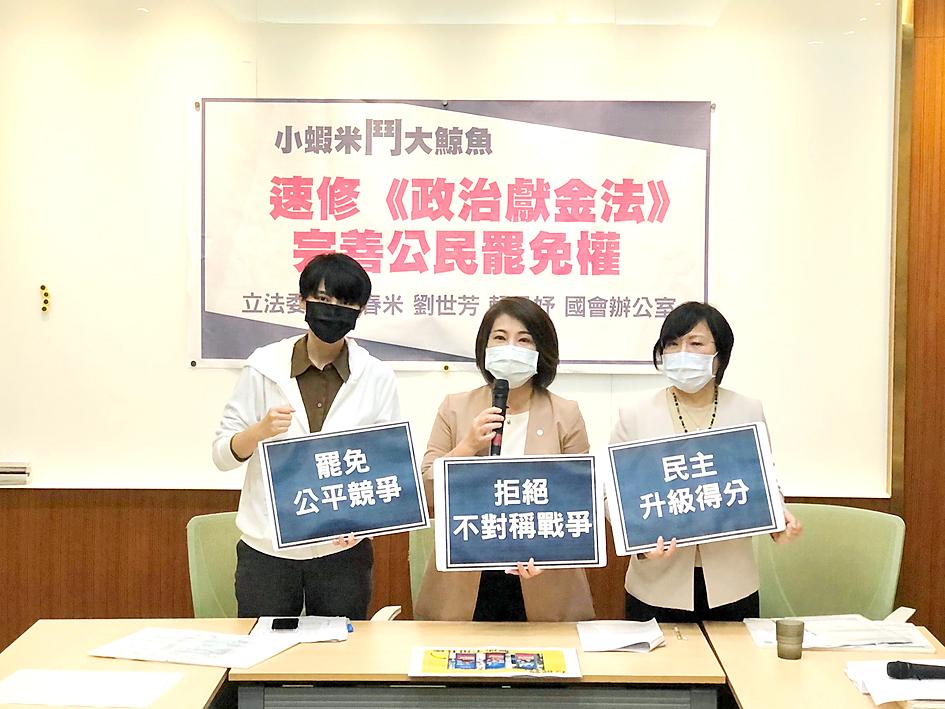The Democratic Progressive Party (DPP) yesterday proposed an amendment to the Political Donations Act (政治獻金法) to allow those launching recall-related events to receive political donations, saying that the current regulations infringe on people’s right to recall officials.
The draft amendment says that groups launching a recall of officials and those being recalled should both be able to receive political donations, but the groups initiating the process would have to pass the first stage of collecting signatures before they can ask for donations.
The funds could not be used for other purposes and all donations to either side would have to be turned over to the government once the efforts to launch a recall, or a recall vote, have concluded, it says.

Photo courtesy of Chou Chun-mi’s office
Article 17 of the Constitution says that the rights of election and recall are important factors for public participation in politics, said DPP Legislator Chou Chun-mi (周春米), one of the sponsors of the bill.
However, the act currently only designates political parties and groups, as well as candidates, eligible recipients of political donations, and fails to address by-elections resulting from a successful recall, Chou said, adding that the oversights go against the nation’s democratic system.
DPP Legislator Liu Shih-fang (劉世芳) said that a recall vote launched against Kaohsiung Mayor Han Kuo-yu (韓國瑜) has highlighted the inadequacies of the current system.
The Wecare Kaohsiung coalition of civic groups gathered sufficient signatures to launch the recall vote against Han, which was approved by the Central Election Commission and is to be held on Saturday next week.
Civic groups are comprised of regular citizens and would face difficulty standing up to the concerted actions of a government, such as those of Han and the Kaohsiung City Government, Liu said.
DPP Legislator Lai Pin-yu (賴品妤) cited documents previously released by Wecare Kaohsiung showing that it had spent NT$8 million (US$266,773) staging rallies.
Han is the only public figure in Taiwan to be the target of two recalls, following one in 1994 when he was a legislator, Lai said.
Han and the Kaohsiung City Government’s actions highlight the urgent need to amend relevant legislation and systems, she added.

POSITIVE DEVELOPMENT: Japan and the US are expected to hold in-depth discussions on Taiwan-related issues during the meeting next month, Japanese sources said The holding of a Japan-US leaders’ meeting ahead of US President Donald Trump’s visit to China is positive news for Taiwan, former Japan-Taiwan Exchange Association representative Hiroyasu Izumi said yesterday. After the Liberal Democratic Party’s landslide victory in Japan’s House of Representatives election, Japanese Prime Minister Sanae Takaichi is scheduled to visit the US next month, where she is to meet with Trump ahead of the US president’s planned visit to China from March 31 to April 2 for a meeting with Chinese President Xi Jinping (習近平). Japan and the US are expected to hold in-depth discussions on Taiwan-related issues during the

‘LIKE-MINDED PARTNER’: Tako van Popta said it would be inappropriate to delay signing the deal with Taiwan because of China, adding he would promote the issue Canadian senators have stressed Taiwan’s importance for international trade and expressed enthusiasm for ensuring the Taiwan-Canada trade cooperation framework agreement is implemented this year. Representative to Canada Harry Tseng (曾厚仁) in an interview with the Central News Agency (CNA) said he was increasingly uneasy about Ottawa’s delays in signing the agreement, especially as Ottawa has warmed toward Beijing. There are “no negotiations left. Not only [is it] initialed, we have three versions of the text ready: English, French and Mandarin,” Tseng said. “That tells you how close we are to the final signature.” Tseng said that he hoped Canadian Prime Minister Mark Carney

President William Lai (賴清德) yesterday bestowed one of Taiwan’s highest honors on Saint Vincent and the Grenadines (SVG) Ambassador Andrea Clare Bowman in recognition of her contributions to bilateral ties. “By conferring the Order of Brilliant Star with Grand Cordon on Ambassador Bowman today, I want to sincerely thank her, on behalf of the Taiwanese people, for her outstanding contribution to deepening diplomatic ties between Taiwan and SVG,” Lai said at a ceremony held at the Presidential Office in Taipei. He noted that Bowman became SVG’s first ambassador to Taiwan in 2019 and

A man walks past elementary school artworks at the Taipei Lantern Festival in Ximen District yesterday, the first day of the event. The festival is to run from 5pm to 10pm through March 15.